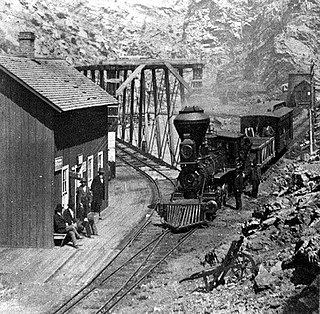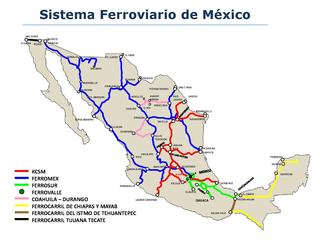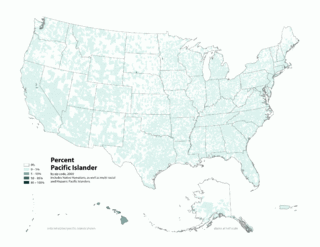
Howland Island is an uninhabited coral island located just north of the equator in the central Pacific Ocean, about 1,700 nautical miles (3,100 km) southwest of Honolulu. The island lies almost halfway between Hawaii and Australia and is an unorganized, unincorporated territory of the United States. Together with Baker Island it forms part of the Phoenix Islands. For statistical purposes, Howland is grouped as one of the United States Minor Outlying Islands. The island has an elongated cucumber-shape on a north–south axis, 1.40 by 0.55 miles, and covers 1 square mile.
Columbia most often refers to:

A transcontinental railroad or transcontinental railway is contiguous railroad trackage, that crosses a continental land mass and has terminals at different oceans or continental borders. Such networks can be via the tracks of either a single railroad or over those owned or controlled by multiple railway companies along a continuous route. Although Europe is crisscrossed by railways, the railroads within Europe are usually not considered transcontinental, with the possible exception of the historic Orient Express. Transcontinental railroads helped open up interior regions of continents not previously colonized to exploration and settlement that would not otherwise have been feasible. In many cases they also formed the backbones of cross-country passenger and freight transportation networks. Many of them continue to have an important role in freight transportation and some like the Trans-Siberian Railway even have passenger trains going from one end to the other.
Big Four or Big 4 may refer to:

The Union Pacific Railroad is a Class I freight-hauling railroad that operates 8,300 locomotives over 32,200 miles (51,800 km) routes in 23 U.S. states west of Chicago and New Orleans. Union Pacific is the second largest railroad in the United States after BNSF, with which it shares a duopoly on transcontinental freight rail lines in the Western, Midwestern and West South Central United States.

PCCW Limited is a Hong Kong-based information and communication technology (ICT) and telecommunications company.
Mandarin or The Mandarin may refer to:
New Holland may refer to:
Southern Railway or Southern Railroad may refer to:

The Colorado Central Railroad was a U.S. railroad company that operated in Colorado and southeastern Wyoming in the late 19th century. It was founded in the Colorado Territory in the wake of the Colorado Gold Rush to ship gold from the mountains. It expanded from its Golden–Denver line to form a crucial link connecting Colorado with the transcontinental railroad and the national rail network. The history of the railroad throughout the 1870s was driven at times by a fierce struggle between local interests, led by W.A.H. Loveland, and outside investors of the Union Pacific Railroad led at times by Jay Gould. The early struggle of the company to build its lines was a major part of the early competition between Denver and Golden for supremacy as the principal metropolis of Colorado.
The Pacific Northwest Bell Telephone Company is an AT&T majority-owned Bell System company that provides local telecommunications services in Oregon, Washington, and northern Idaho. Pacific Northwest Bell Telephone Company was formed on July 1, 1961 when it was spun off from the Pacific Telephone and Telegraph Company. On January 1, 1984, Pacific Northwest Bell was split from AT&T as ordered in the settlement of United States v. AT&T and became a subsidiary of the newly formed Regional Bell Operating Company US WEST, Inc. Pacific Northwest Bell became dormant when US WEST consolidated its three main subsidiaries, forming US WEST Communications, Inc. on January 1, 1991. US WEST merged with Qwest Communications International Inc. in 2000, and the US WEST brand was replaced by the Qwest brand. Qwest Communications merged with Louisiana-based CenturyLink in 2011, and the Qwest brand was replaced by the CenturyLink brand. As of January 1, 1991 the Pacific Northwest Bell name is not used for marketing anymore although the PNB provider still exists. The Pacific Northwest Bell identity was revived by and is now doing business as CenturyLink/LUMEN. The name was revived in the early 2010s.
The South Pacific Ocean or "South Pacific" is the Southern Hemisphere portion of the Pacific Ocean.

Embarq Corporation was the largest independent local exchange carrier in the United States, serving customers in 18 states and providing local, long-distance, high-speed data and wireless services to residential and business customers. It had been formerly the local telephone division (LTD) of Sprint Nextel until 2006, when it was spun off as an independent company. Embarq produced more than $6 billion in revenues annually, and had approximately 18,000 employees. It was based in Overland Park, Kansas.

Mexico has a freight railway system owned by the national government and operated by various entities under concessions (charters) granted by the national government. The railway system provides freight and passenger service throughout the country, connecting major industrial centers with ports and with rail connections at the United States border. Passenger rail services were limited to a number of tourist trains between 1997, when Ferrocarriles Nacionales de México suspended service, and 2008, when Ferrocarril Suburbano de la Zona Metropolitana de México inaugurated Mexico's first commuter rail service between Mexico City and the State of Mexico. This is not including the Mexico City Metro, which started service in 1969.
Qwest Corporation is a Regional Bell Operating Company owned by Lumen Technologies. It was formerly named U S WEST Communications, Inc. from 1991 to 2000, and also formerly named Mountain States Telephone and Telegraph Company, known as Mountain Bell from 1911 to 1991. It includes the former operations of Malheur Bell, Northwestern Bell and Pacific Northwest Bell as well.

Pacific Islander Americans are Americans who are of Pacific Islander ancestry. For its purposes, the United States census also counts Aboriginal Australians as part of this group.
PNG most often refers to:

Qwest Communications International, Inc. was a United States telecommunications carrier. Qwest provided local service in 14 western and midwestern U.S. states: Arizona, Colorado, Idaho, Iowa, Minnesota, Montana, Nebraska, New Mexico, North Dakota, Oregon, South Dakota, Texas, Utah, Washington, and Wyoming.
Lumen Technologies, Inc. is an American telecommunications company headquartered in Monroe, Louisiana, that offers communications, network services, security, cloud solutions, voice, and managed services. The company is a member of the Fortune 500 and has been on the S&P 600 index since being removed from the S&P 500 in March 2023.
Sealand is an unrecognized micronation off the coast of Suffolk, England.








